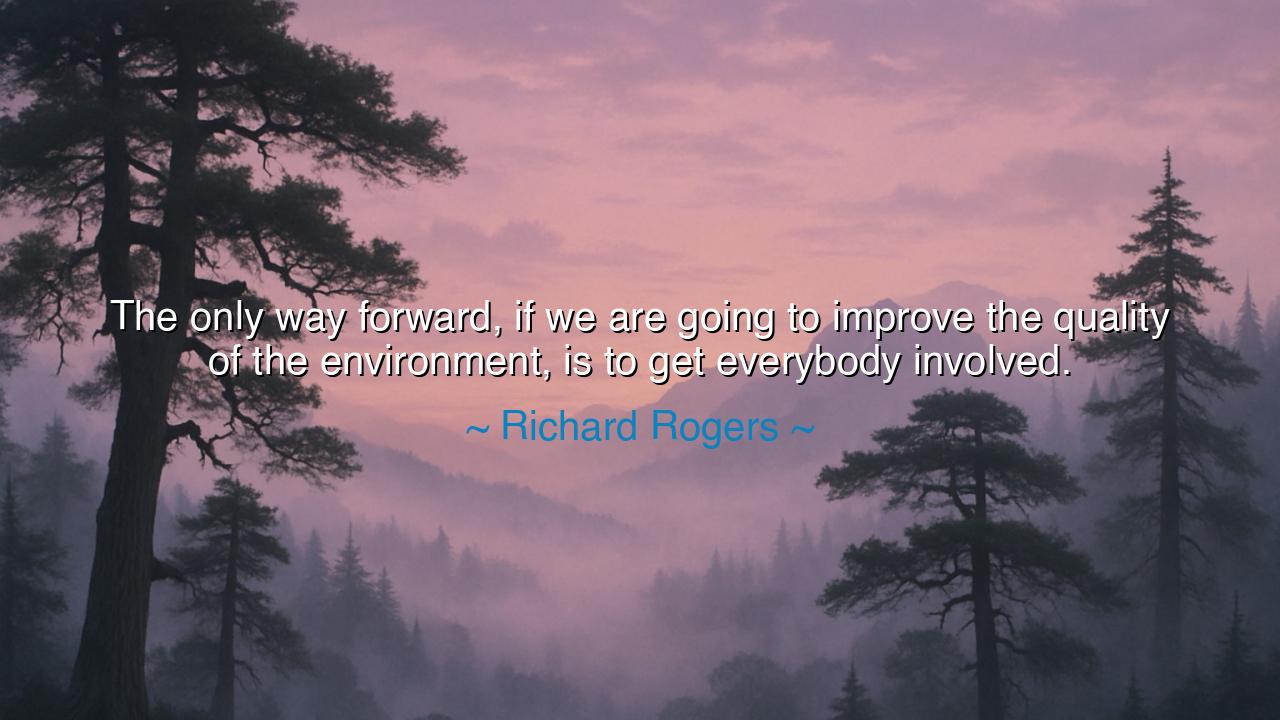
The only way forward, if we are going to improve the quality of
The only way forward, if we are going to improve the quality of the environment, is to get everybody involved.






In the words of Richard Rogers, the visionary architect of both buildings and ideas, we hear a call that echoes beyond stone and steel: “The only way forward, if we are going to improve the quality of the environment, is to get everybody involved.” These words are not merely a reflection of one man’s wisdom, but a summons to all humankind. They speak to the sacred bond between people and the earth, a bond too often forgotten in the fever of progress. In these words lies an ancient truth—that no single hand can heal the world, but many, united in purpose, can shape it anew.
To understand this teaching, we must first grasp the heart of it: unity in stewardship. The earth is not the possession of one generation, nor the inheritance of a single people. It is the mother of all life, the vessel of our past and the cradle of our future. Yet, how swiftly have we taken her gifts for granted—her rivers poisoned, her forests burned, her air thickened with the smoke of our neglect. Rogers’ words arise not from despair, but from a conviction born of hope—that only together, through shared purpose and participation, can humanity restore balance to the world it has wounded.
In the ancient world, the philosopher Solon of Athens once warned his people that a city’s ruin does not come from foreign invasion, but from its own citizens’ apathy. When the people ceased to care for the common good, when they believed the city’s fate was not their concern, decay followed swiftly. In this, the fate of Athens mirrors the fate of our planet today. For what is the environment, if not the great city in which all living things dwell? And what is apathy toward it, if not the quiet acceptance of its fall?
But when the people awaken—when they take responsibility—the impossible becomes possible. Consider the tale of the reforestation of South Korea after the Korean War. The land had been stripped bare, its hills eroded, its forests burned. The government, led by President Park Chung-hee, called upon every citizen to join in the labor of renewal. Children planted saplings beside their parents; soldiers planted trees between their drills; villagers worked together to restore the soil. Within a generation, the once-barren mountains were clothed again in green. This miracle was not wrought by machines or wealth, but by collective effort—by the belief that the care of the earth belongs to all.
Rogers’ wisdom, then, reminds us that progress without participation is hollow. The architect who designs a sustainable city, the farmer who tends his soil with respect, the teacher who instills love for nature in a child—all are builders of the same future. But when people turn away, believing that “someone else” will save the world, the chain of action breaks, and decay begins anew. The environment, like democracy, survives only when nourished by the hands of the many.
There is also a deeper, spiritual current beneath these words. To be involved is not merely to act, but to belong—to recognize that we are threads in a single tapestry of life. Every breath we take is the gift of trees; every meal, the fruit of the earth. When we harm nature, we wound ourselves. When we restore her, we heal our souls. This interdependence is the great law of existence, older than any scripture and truer than any creed. To live by it is to honor both creation and Creator.
Therefore, let this teaching be passed to those who come after us: do not wait for others to act. Plant a tree, teach a child, clean a riverbank, speak for the voiceless creatures of the earth. Small acts, multiplied by millions, become the turning of an age. Just as one spark can light a thousand lamps, one heart awakened to care can inspire a generation.
And so, as Richard Rogers reminds us, the only way forward is not through isolation, but through involvement—through shared purpose and the courage to act as one. For the earth does not need our pity; she needs our participation. When humanity stands together, hands joined in reverence and resolve, even the most desolate wasteland can bloom again. Let this be our vow: to rise as caretakers, not conquerors, and to walk forward—together—into a future worthy of the world that gave us life.






AAdministratorAdministrator
Welcome, honored guests. Please leave a comment, we will respond soon